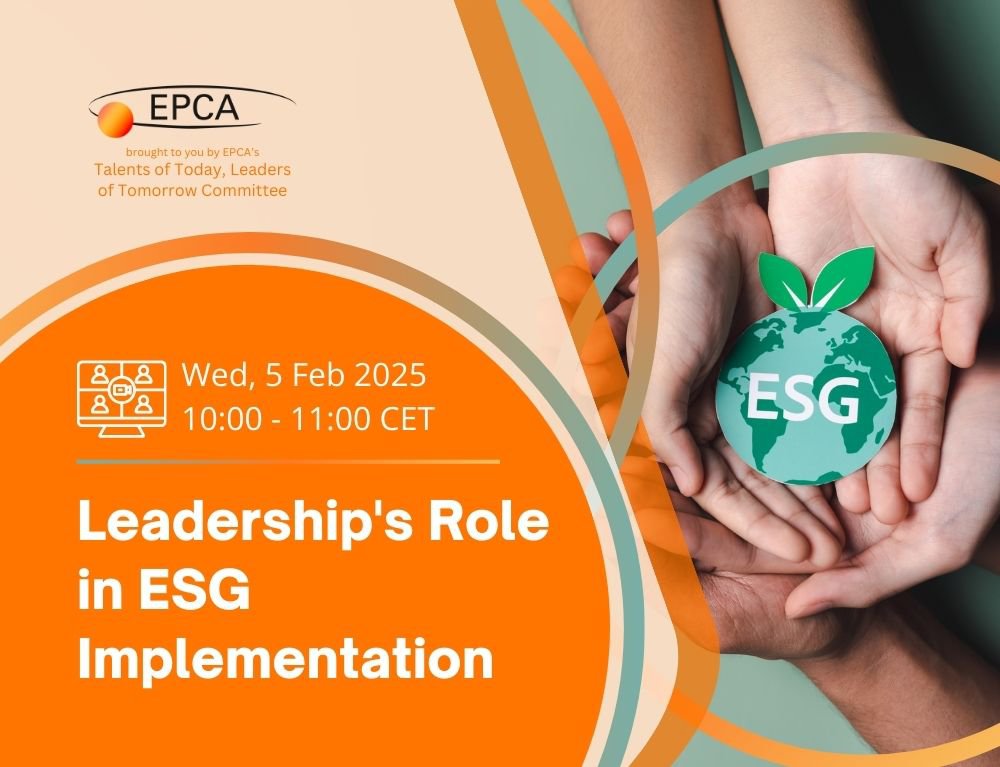



As part of the EPCA Talent and Leadership Committee's ongoing commitment to fostering impactful leadership through ESG, we ran an ESG-related webinar series from November 2024 to March 2025. The fifth webinar explores the role of leadership in driving successful ESG initiatives, with a spotlight on governance structures, management buy-in, and the integration of sustainable strategies within core business operations. In this article, we summarize the key takeaways from that session.
Download the webinar presentation slides HERE.
Strong leadership is essential for successfully implementing the Corporate Sustainability Reporting Directive (CSRD) and building a sustainable business. Leadership should involve everyone in the company, from top management to everyday employees. Here’s what that looks like:
Since many companies are still developing their sustainability strategies, CSRD requirements can serve as a useful push to strengthen leadership, improve sustainability management, and build a more sustainable corporate culture. Below you will find examples of sustainability management frameworks and sustainability governance.
The CSRD requires companies to report on how they manage important sustainability issues. To do this, businesses need a clear sustainability management framework that covers four key areas:

On the one hand, the CSRD requires companies to disclose information on the aforementioned management framework, which increases bureaucratic effort. On the other hand, companies can also see how the active advancement of an effective sustainability management framework can be a business opportunity and a drive of sustainability transformation, while simultaneously fostering and exercising successful sustainability leadership.
In order to achieve effective sustainability governance, companies should set up an adequate sustainability organisation structure, ensuring the right mix of key skills and competencies within sustainability teams and creating suitable incentive schemes.
An effective sustainability governance structure requires a certain degree of central orchestration and consistency while also reflecting the specifics of different business models. This requires the buy-in of management boards and a clear board-issued mandate including a commitment to maintaining adequate staff levels. While a variety of different setups are feasible in principle, companies often appoint a central sustainability function reporting to the CEO or CFO and coordinating sustainability endeavors across business units. This function is often responsible for reporting requirements, such as the CSRD, coordinating the overall report and requesting the necessary input from decentralized sustainability experts within the different business units.
In addition to ensuring adequate staff levels to cope with the workload of the sustainability function, companies should focus on cultivating sustainability leadership profiles, characterized by specific skills and personal attributes. While the required skills and competencies are highly context-dependent and vary with different industries, companies and geographies, research[1] shows that a mix of different characteristics and competencies boosts the effectiveness of the sustainability organisation.
Key personal qualities and competencies of successful sustainability leadership profiles are depicted in Figure 2. Key individual skills and attitudes for sustainability leadership are shown Figure 3.
While the qualities identified in Figure 2 typically develop slowly over time, the competencies for sustainability leadership in Figure 3 can usually be actively developed, e.g. through training, experience and mentorship programs.


Lastly, companies with an effective sustainability governance typically embed sustainability criteria into incentive schemes. This includes formal target agreements that may also consider long-term effects, e.g. through deferred bonuses. Sustainability performance can also play a role in promotion decisions. In addition, companies can drive sustainability change by publicly acknowledging or awarding successful sustainability leadership.
Effective sustainability leadership is a key success factor to master the sustainability transformation and therefore a topic that companies should address consciously. However, implementing it is complex and requires a mix of formal and informal measures. Organisations can leverage CSRD requirements to establish value-adding sustainability management and create the right framework conditions to design strategies and drive their implementation across all levels of the organization.
Establishing formal sustainability governance within the organisation and assembling diverse teams motivated by – amongst others – sustainability incentive schemes can strengthen this framework. By offering trainings and workshops on sustainability topics and by leveraging senior resources’ experience through mentorship and networking programs, companies can foster knowledge transfer and ensure sustainability literacy. Lastly, companies should adopt an open and transparent communication culture on sustainability efforts and progress, actively involving employees in the sustainability journey and encouraging innovation.
Ultimately, implementing CSRD and other sustainability reporting requirements greatly benefits from effective sustainability leadership. In turn, these reporting obligations often present an opportunity to strengthen and advance sustainability leadership practices.

Authors: Denis Ludwig and Johannes Rehn, d-fine

[1] For details, cf. study "Individual Sustainability Leadership" by EPCA and Antwerp Management School, 2020